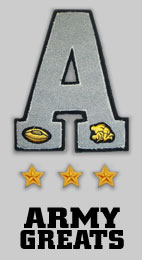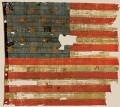PURPOSE
Insure the Corps of Cadets today & in future years is aware of and understands the significance of what was accomplished in the Fall of 1953.
Method
1. Acceptance of the 1953 Army Football Team into the Army Sports Hall of Fame.
a. A 13 Page Nomination submitted.
b. An internal Academy decision removed Teams from consideration. The Purpose of Hall of Fame has not changed. It still includes Teams
c. Effort will be made to affect reversal of decision.
2. Convince Thayer Committee to select the 1953 Football Team as part of the distinguished graduate dedicated room program. http://rdp.thethayerhotel.com/
3. Wayne Culbreth is Point of Contact 845 445-8534, note new Email address is wculbreth@thayerfellows.org
4. 1953 Team was selected for inclusion on 1 March 2011.
Funding
1. A $25,000 contribution is required.
a. Funds are used to furnish the room including; 2 plaques on the door one for the
Team, and one under the Team for the Sponsor; a hanging in the hallway of the Team; and a listing in a dedicated display in the Lobby. In addition the story will be told in perpetuity on the Thayer History Channel. http://rdp.thethayerhotel.com/Thayer-RoomDedication.pdf
b. The room decor will reflect the accomplishments of that season with photos and memorabilia associated with the 1953 Season. Each guest will be offered a video commemorating the Team. Subsidized Books will be sold by the Thayer.
c. Remaining funds will be directed toward the high tech upgrade of the room and the Hotel.
2. Additional funding is required.
a. Funds include a standardized video reflecting the accomplishments of each Honoree.
b. However, the story of the 1953 season is more extensive than just a highlight film of the Team’s accomplishments. The complete story of the ’53 season must be told. The Thayer is evaluating the expected requirements to accurately depict what was accomplished that Fall.
Source of Funds
1. Funding for the room, additional funding for an enhanced video, and memorabilia will be by the 1953 – 1954 Corps of Cadets.
2. The Class of 1954 will have an organized Class effort to fund and secure memorabilia.
3. The Class Leaders from the Classes of ’55, ’56, and ’57 will be contacted to determine Class interest in support of the Room Designation.
4. The Register of Graduates has been utilized to contact individual members of ’55, ’56, and ’57 to seek support .
A draft Plaque is at
http://forwhattheygaveonsaturdayafternoon.com/draft-plaque/53-team
The video narration will be by a 1954 Graduate.
The material to be used is at http://forwhattheygaveonsaturdayafternoon.com/wp-teams/football/1953-football and http://forwhattheygaveonsaturdayafternoon.com/wp-53/nom-team in addition game highlight film will be used
1. After the highlights of the Northwester game, the narrator will comment -During the 1953 season the rules of substitution changed (ostensibly because of the Korean War and the lack of young men to play college football) to essentially eliminate the two platoon system that had been used previously.
2. Lowell Sisson will be asked to comment – After the 1952 season, during which I played offensive end, I was switched to play halfback at the start of Spring practice. I continued in that mode until just before the start of the 1953 season. About 10 days before the season was to start I was called in to Col Blaik’s office. Fearful regarding what the reason was, I reported in to find Col Blaik and Vince Lombardi there and they proceeded to ask me what my reaction would be if they were to switch me back to end. I said I did not care where they wanted me to play as long as I could be of value to the team. They did not explain why they wanted to make this change and I did not ask … maybe I should have. I speculated that the new substitution rule had something to do with it. I must admit I always thought I was a better halfback than an end.During the 1953 season the rules of substitution changed (ostensibly because of the Korean War and the lack of young men to play college football) to essentially eliminate the two platoon system that had been used previously.
3. Twenty-twenty hindsight revealed to me that they knew they had a diamond in Don Holleder and with the two platoon system he would have more than replaced me. But because we had to play both offense and defense they must have concluded that it would be better to leave me at end.
4. Because of the switch back to end I did not get totally grooved into playing defensive end and this contributed (in my mind) to a large degree why we lost our only game that season. I felt I played a terrible game against Northwestern and contributed mightily to our defeat.
5. Narrator — Lowell Sisson made up for the Northwestern loss in the Navy Game. On the kickoff, Norm Stephen came down the field so fast and so hard that he had knocked the ball right out of the Navy player’s hands and right into Lowell’s hands on the Navy 30 yard line. Lowell remembers Norm Stephen as a real leader, a motivator for the Team.
6. At the conclusion of the Duke highlights the narrator will comment on Bob Mischak’s professional career – Bob Mischak who started in the Famed 1958 “Greatest Game Ever Played” and who as a player and coach was member of 3 Super Bowl winning teams, involvedin 8 AFC Champion’ship games and numerous playoff games had this to say
7. Bob Mischak will be asked to comment on the Duke Game – As many reports have stated, the 1953 team “Returned to Glory” with the defeat of the nationally ranked Duke Blue Devils at the Polo Grounds in New York City. From a player’s stand point, that was the epitome of any game, team, and student body support that I’ve been associated with – bar none.
Additional Considerations
1. The First & Last Name listed under the Team photo in the room. We could add Class if it is felt appropriate.
2. A framed listing of each donee by Class could be put in the room.
3. A request would be made to ODIA to record 2 or 3 reps of the drum roll, bugle and GO! GO! GO! by the Corps of Cadets.



































































































































